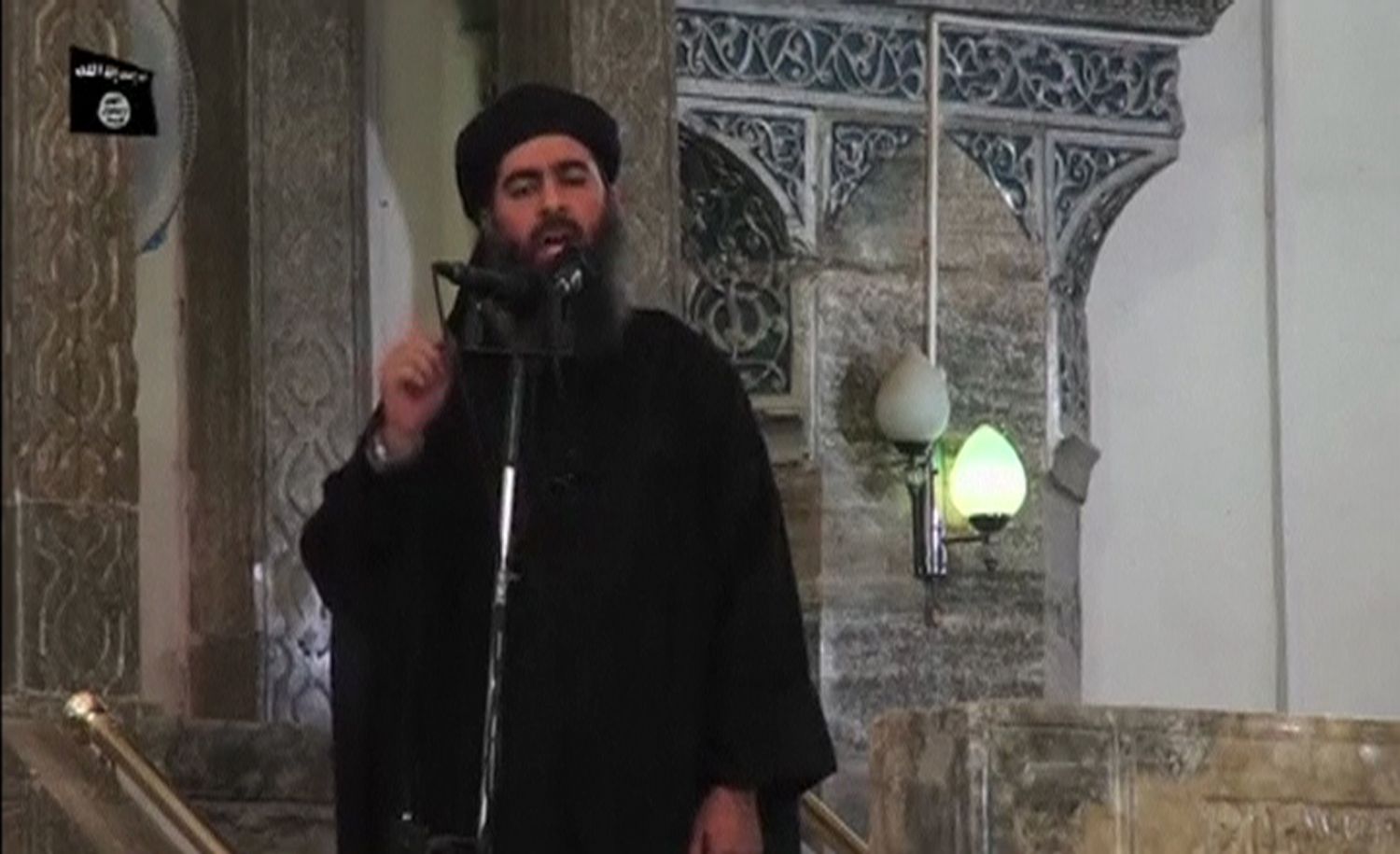
The Islamic State militant group (ISIS) has released a new audio message delivered by its elusive leader Abu Bakr al-Baghdadi, who had not spoken since November 2016, in which he mentions North Korea's "nuclear threat to the U.S." The audio suggests he remains alive despite speculation over his fate.
"The North Koreans have begun threatening America and Japan with nuclear power, and the Americans, Russians and Europeans live terrified in fear of strikes from the mujahedeen," he said.
The date of the audio recording remains unclear but the reference to North Korea's nuclear threat appears to point to a recent war of words between President Donald Trump and Pyongyang's leader Kim Jong Un. Both have shot fiery salvos at the other, with Trump calling Kim "Rocket Man" and the North Korean leader calling his American counterpart a "dotard" as they threatened military action.
The 45-minute audio message, distributed by the group's Al-Furqan media organization on official ISIS channels on the encrypted app Telegram, is filled with conservative religious speech and references to Islamic history. It appeared alongside the text "may Allah protect him," another indication that the leader remains alive.
In his last speech in November 2016, Baghdadi delivered a typical edict about the fight against the Syrian regime of Bashar al-Assad, and a call for the targeting of Shia Muslims. But the main message was that the group's fighters must continue the battle for Mosul, the city in the midst of a siege by Iraqi ground forces backed by the U.S.-led coalition.
Now, after Mosul's liberation in July, Baghdadi says that this speech "should not link between losing territory and truth," in reference to the group's dwindling hold of swathes of land in Iraq and Syria.
He speaks of some of the group's fallen population centers, saying he is "certain that bloodshed in Mosul, Raqqa, Sirte, Ramadi and Hama will eventually lead to the downfall of tyrants," according to a translation by Hassan Hassan, senior fellow at the Tahrir Institute for Middle East Policy, a nonpartisan organization based in Washington, D.C.
The mention of Mosul indicates that the speech may have been created in the months following the group's defeat in the city in July. Baghdadi goes on to say that American complacency had allowed Russia to take "control of the Syria portfolio," the country leading the battle to liberate the group's last remaining Syrian stronghold in Deir ez-Zor.
In terms of targeting, Baghdadi points to attacks against the U.S. and Iran.
"Baghdadi's new address indicates America and Iran remain priority targets. Address may serve as trigger for attacks," Michael S. Smith II, co-founder of U.S.-based Kronos Advisory tweeted.
Russia said in mid-June that it had killed Baghdadi in a May airstrike near Raqqa as he met with other top ISIS leaders at a military council meeting. The Syrian Observatory for Human Rights (SOHR), a U.K.-based monitoring group, said it had received information that Baghdadi had been killed.
But the U.S.-led coalition said it had no evidence of Baghdadi's death. Top Kurdish intelligence officials also asserted that they were "99 percent" sure that Baghdadi remained alive.
The U.S. has placed a bounty of $25 million on the head of Baghdadi for information leading to his capture or whereabouts. He has led the rise of the most brutal jihadi group in the world, one that has raped, beheaded and pillaged its way across Iraq and Syria, earning up to $1 billion in revenues in 2014.
Baghdadi became one of the most wanted men in the world after he delivered an address in July 2014 from the pulpit of the Grand al-Nuri Mosque in the northern Iraqi city of Mosul. It would become known as the speech that declared the formation of the Islamic State, a self-proclaimed caliphate that would grow to become bigger than the size of Belgium.
Officials in the U.S. and Iraq believe that Baghdadi is hiding in large stretches of desert land across the Iraqi-Syrian border.
An Iraqi official, speaking on condition of anonymity, told Newsweek in March that Baghdadi was no longer in Mosul but now moves across the Iraqi-Syrian border in some of the largely lawless areas in which ISIS retains control.
"He moves between al-Hajin in Syria and al-Ba'aj in Iraq," the official said. The western Iraqi border has served as a key transit point and supply line for ISIS fighters and resources in and out of Syria. ISIS still controls a stretch of the border.
Uncommon Knowledge
Newsweek is committed to challenging conventional wisdom and finding connections in the search for common ground.
Newsweek is committed to challenging conventional wisdom and finding connections in the search for common ground.
About the writer
Jack is International Security and Terrorism Correspondent for Newsweek.
Email: j.moore@newsweek.com
Encrypted email: jfxm@protonmail.com
Available on Whatsapp, Signal, Wickr, Telegram, Viber.
Twitter: @JFXM
Instagram: Read more
To read how Newsweek uses AI as a newsroom tool, Click here.








